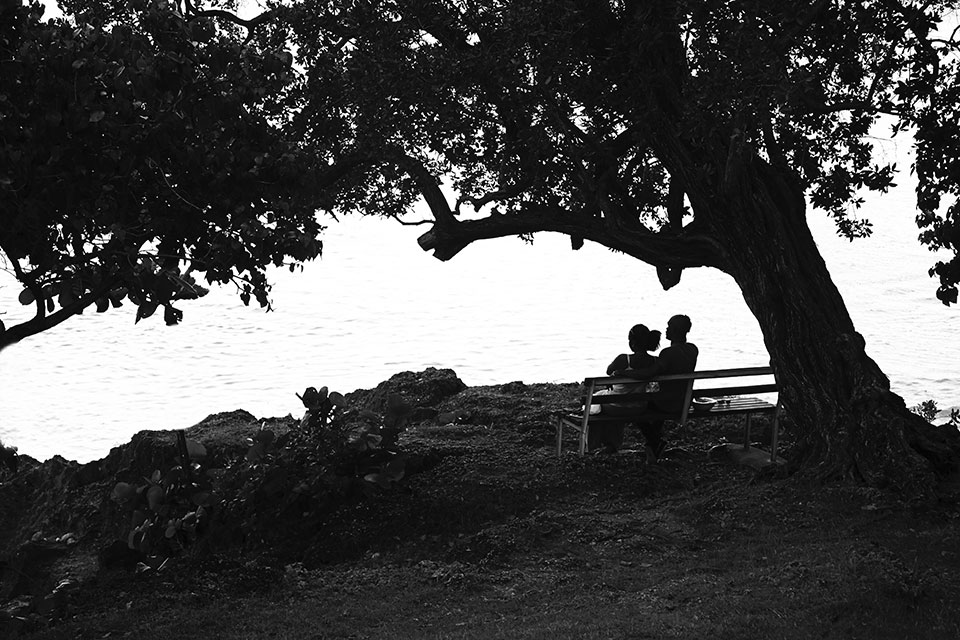Marie’s Proof of Love
People believe, Marie thinks, even when there’s no proof. You believe because you imagine. But is imagination enough to live by?
Die. This is what Marie had always been told not to say to anyone from a young age. Though she could have said it secretly when no one was around—for who would know?—she never once allowed herself to say it or even feel that way. She generally kept all thoughts of death out of her mind.
But all around her, people talked about dying like it was no big deal. It was everywhere, even after she moved. People joked about it on TV, not to mention the internet, which she occasionally perused. Telling someone to die was so common that it seemed like an everyday greeting. No one actually died because someone told them to—in fact, people died from all sorts of reasons. It was just a meaningless joke. But every time she would hear the word, Marie’s body would tense up. She imagined her father coming toward her—her father who berated her for hours for every little mistake she made, grabbing her with his large hands that seemed disproportionate to his small body. She braced herself in terror. Of course, he never appeared in the music room, the common room, the telephone room, or the courtyard with the camphor tree. I’m not at home anymore, this is Mia dormitory. She would repeat the phrase to herself whenever she felt threatened by her father’s presence, as if she were saying a prayer. I’m not at home anymore. Those days were over; they died along with the cells that had made up her body back then. Her hair and fingernails were all fresh and new. She hugged her renewed self and covered her cheeks with both hands as if the gesture would somehow protect her. Still, in the middle of the night, Marie would hear the whispers in her ear. If you can remember, it’s still happening right now. Marie would press her hand to her chest and blink fast. She would make sure the shadows of the tree on the wall didn’t swell or shrink. It’s okay. It’s all over. No one can come touch me now. There’s no need to close my eyes and pretend to be asleep. Marie would take a deep breath. That’s right, this is Mia dormitory, far, far away from everything.
One day, Marie came upon a lake.
She had read about lakes in picture books and fairy tales but never imagined they existed in real life. How lovely, she thought, running her eyes over the deep green forest that stretched beyond.
The lake had a distinct outline. It was not like the seaside where the sand and the waves intermingled. Take one step, and I’ll fall into the lake. But as long as I don’t take that step, I’m safe. The thought made her chuckle. The line was so clearly delineated that no one could make a mistake. When you think about it, Marie thought, it’s just like the edge of a cake. She imagined herself standing at the cake’s edge, which she would normally use her little fork to demolish little by little. The massive cake seemed to go on forever, coated with patches of dark soil and weeds. It was an impressive green cake decorated with the forest, bumpy hills, rocks, delicate wildflowers, and corpses of small animals. If this were really a cake, someone would eat it. A cake on a plate was bound to disappear at some point, taking Marie along in its extinction.
A cake on a plate was bound to disappear at some point, taking Marie along in its extinction.
Marie shifted her gaze to the lake once more, still lost in thought. Where does all this water come from? How does it maintain a perfect balance, neither overflowing nor drying up? What if the water was meant to quench the thirst of something much bigger, something unimaginable . . . ?
Marie felt someone come up behind her and turned around. It was Karen. She glanced down at her watch and saw that there was still forty minutes left till meeting time. Karen walked over to her slowly, as if she were doing so against her will. Marie and Karen were roommates last year and, until recently, lovers.
They had ended their relationship about a month ago. After spending countless hours and weeks discussing their breakup in detail, there was nothing left to say, at least so it seemed to Marie. When she observed Karen at a distance like this, every little detail that she disliked about her appearance seemed to glare at her. She would notice them occasionally when they were dating, but now they jumped out at her as if they were highlighted in colorful pens.
Karen’s face was covered in wrinkles, and the lines around her mouth made her look like a middle-age woman. Her carefully sculpted eyebrows gave a vulgar impression. Her head, perched on her short neck, was disproportionately large. She remembered her dark nipples. Marie was aware of these things when they were dating, even when she was in love with her. It made her feel heartless and arrogant to be so judgmental of her lover’s appearance, and she hated herself for it. But it didn’t make Karen any more beautiful in her eyes.
“Everyone is over there,” Karen said to her. “You disappeared into the forest. Anna must be worried sick.”
Through the touch of her palm, Anna understood in an instant what had happened, and the knowledge stopped her breath.
Marie nodded nonchalantly. She could see the exasperated expression on Anna’s face, with her frizzy bangs and brawny arms folded across her chest. Rules are rules, Marie. Her voice, while calm, reminded her of a voice she once knew. Anna was an unhappy woman but also a patient guardian. She had arrived at Mia dormitory in the spring when she had just turned forty years old. Seven years prior, she had lost her one-year-old daughter. Her baby fell asleep the night before, on her back as usual, gazing up at the mobile toy hanging over the crib. But the next morning, the baby didn’t wake up. SIDS—Sudden Infant Death Syndrome, the doctor explained. It’s a common cause of death for infants. There are no warning signs. There was nothing you could do. They all tried to console her, some with tears in their eyes. But Anna could never forget the sensation as she touched her baby’s chubby legs that morning, the bedroom still faintly dark. What was there was no longer. Through the touch of her palm, she understood in an instant what had happened, and the knowledge stopped her breath. She tried to die, many times. She didn’t know what death would bring, but she desperately wanted to be in the same place as her baby. But try as she might, death never took her. Her weight plummeted; she ceased to speak. She wandered aimlessly through the possibilities of what might have been. If only she had put her baby to bed one hour later. If only the temperature had been set one degree lower. If only she had clothed her in something different. If only she had changed the portions of her last feeding. If only she had held her baby in her arms instead of putting her in the crib. Anna’s relationship with her husband went into a kind of paralysis, neither one able to blame or forgive the other. Nothing she put in her mouth had taste; there was no difference between sleeping and waking. In such a state, Anna went in and out of the hospital, and when her divorce was finalized after a long process of arbitration, she went to stay with her older sister. When an even longer time had passed, she began once again to recognize the outlines of things, like the mug that sat in front of her, the trails of a sunset, words, the steady flow of time. It took even longer for her to be able to articulate her sorrow in support groups, to allow herself to cry before those who shared her suffering. For seven years, she stood at a chasm that would never disappear—the world with and without her daughter—until one night, she slept without dreaming. She was able to stir herself from a stasis, even if she had simply tottered to one side. Which side of the chasm she stood on, she didn’t know. But since that night, for the past ten years, Anna had served as the guardian at Mia dormitory.
Marie walked over to the largest tree and sat down on the exposed roots. Karen followed and sat down next to her, and began reminiscing about all kinds of things—back when they were lovers—that no longer meant anything to Marie.
The day Marie was brought to Mia dormitory. How she had arrived almost empty-handed. On the first night they were given permission to go home, how they had spent the night in the back seat of the car that belonged to Karen’s older brother. How they were no longer allowed to be roommates after that incident. Karen went over every detail as if she were remembering them for the first time, forgetting they had already talked everything over. She went on and on, and after a while, events that never took place slowly began to slip into her narrative. Stories she once heard or saw in dreams would mix with her desires, seamlessly weaving into her memory. It was always like that with her. Marie stared out onto the lake and listened halfheartedly to Karen’s ramblings. But when she began talking about a song Marie once composed, Marie snapped and glared at her.
“I asked you not to bring that up anymore.”
“Why not? It was such a good song.”
Karen wondered if she went too far, yet again. Marie shifted her gaze back to the lake and remained still. They were wearing their hair the same way: the same color, the same length, parted in the center and braided past their shoulders, showing off their shapely foreheads. The only thing that differed was the color of the hair bands. It had barely been a month since they broke up, and people were just beginning to get used to it. What a silly coincidence about the hair, Marie sighed to herself. She felt annoyed and fretted over being seen with Karen. She wanted to get up and leave but knew Karen would tag along behind her. The last thing she wanted was to be seen coming out of the forest together.
“I’m not looking for an argument,” Karen whispered. “I’m okay with the fact that we broke up. I don’t have any regrets or anything, it’s just that . . .”
“. . . what?” Marie demanded.
Whenever Marie heard an incomplete phrase, she couldn’t help herself from retrieving what lay ahead. Karen knew this well.
“It’s just that, what?” Marie repeated impatiently. Karen secretly rejoiced in having stirred Marie’s emotions, but she put on a perplexed expression and sighed audibly.
“I know it’s annoying to keep talking about us. But there’s something I want to ask you.”
“What is it?”
“It’s simple. I want to know if you really loved me.”
“If I really loved you?”
“That’s right,” Karen nodded. “I want to know whether you really loved me or not.”
“Why would you ask such a thing?” Marie shot back. Why would you ever ask such a thing? What’s the point? Marie was reminded of Karen’s narcissistic, sentimental side and wanted to kick herself for engaging in the conversation.
“Oh, Marie,” Karen continued, pretending not to notice her annoyance. “Does it matter why? I’m allowed to be curious, aren’t I? Not everything has to have a purpose.”
“And I’m allowed to refuse to answer, right?” Marie replied. “Plus, how am I supposed to answer such a question? If I said, Yes, Karen, I did love you, would that satisfy you? Is that what you want to hear?”
“You don’t have to get defensive,” Karen squinted her eyes. “It’s a simple question. Did you love me or not?”
Marie studied Karen’s carefully sculpted eyebrows. They didn’t complement the shape of her eyes, and the severe angle and length reminded her of an insect’s antennae. She could hardly believe that she had spent hours kissing a girl with such eyebrows, let alone what followed those kisses. Trying to obliterate the memories that threatened to surface, Marie asserted in a harsh tone: “In any case, there’s no point. It’s over between you and me now. I don’t feel like talking about love with someone who no longer means anything to me.”
She could hardly believe that she had spent hours kissing a girl with such eyebrows, let alone what followed those kisses.
After a brief silence, Karen nodded as if in agreement. The muscles on both sides of her lips twitched as she forced a smile. “Well, maybe I was wrong.”
“Right, okay then. You can go ahead and get back to the group. I’ll join you later.” Marie furrowed her eyebrows and crossed her arms against her chest.
But Karen continued, “What I mean is, maybe I was wrong about not having any regrets. Maybe I do. I still look at photos, you know.”
“Photos?” Marie snapped in a cold voice. “What photos?”
“Photos of you, of course. Oh, don’t worry, I don’t show anyone. I just look at them in secret when I’m all alone.” Karen smiled reassuringly.
“Karen . . . we promised each other when we broke up that the next time we went home, we would delete all the photos. You went home and told me you deleted everything. So unless you’re a liar, you should have no more photos of me to look at.”
Marie glared at Karen, emphasizing every word. Karen shook her head, looking embarrassed.
“I know we promised. I changed my mind. Plus, memories don’t belong to anyone. What happened between us—well, they happened. I’m just honest with myself, that’s all.”

Marie glanced down at her watch. There was still twenty minutes left till meeting time. They would hike down the same mountain path, and within an hour they would be back in their familiar dorm. She would watch some silly TV show in the common room with other girls until dinnertime. Or hide away in her room to read some stupid book, and scribble this and that in her diary. After dinner, she would take her medication and be in bed for attendance call before lights out. She would lie under the covers smothering all thoughts until the patterns on her inner eyelids expanded and took over. It was always the same.
No matter how hard Marie tried to focus on the forest and the lake that spread before her, they no longer filled her with intense emotions. She felt indifferent to everything. There was a delicate cup placed between her lungs—and every time she felt this way, the cup would fill up, drop by drop, as if catching rain. She didn’t know what color the drops were, where they came from, or how long it would take to fill the cup. But—Marie felt sure of this—when the cup overflows, she would die. Would it be an accident? A murder? A suicide? One drop, then another. The drops came down, aiming for the cup. Marie had no desire to die. She wished to live happily ever after, like the other Mia girls. It wasn’t her fault that the cup existed inside her, slowly but surely filling up.
“Karen,” Marie whispered, still looking out onto the lake. “Is there something you couldn’t do, no matter what?”
Karen was surprised to hear the gentle tone in Marie’s voice after her own provocative statement earlier. She couldn’t read any emotion in Marie’s face but liked the somewhat vacant expression she had. It was the same look she had when taking those sleeping pills at night, the few minutes before she drifted off to sleep. Marie would start to lose her train of thought, her words slurred, her eyes gradually blurring out of focus. Marie would seem like a weak little thing. In that state, she became indistinguishable from the faint blue of the evening that seeped in through the window. Watching Marie, who gradually faded into the dark as she lay limp on the bed, Karen could feel she was able to grasp some distant memory that was dear to her.
“Something I couldn’t do?” Karen echoed.
“Right,” Marie continued. “For example—for me, I could never tell someone to die.”
“You mean you could never tell someone to their face?”
“Not just that. I couldn’t even think it.”
“Not even as a joke?”
“No, not even as a joke.”
“Does that bother you?”
“Not particularly.”
“So . . . I guess it’s not a big deal then.”
“I guess not.”
Karen gave the question some thought. “For me
. . .” she said, looking up as if searching for something behind her forehead. “I don’t think I could step on a book. Yeah, that would be it. My parents were teachers, maybe that’s why. I’ve always been told to treat books with respect.”
“A book?”
“Well, not just books. A piece of bread, or someone’s face . . . I probably couldn’t step on most things. But why do you ask?”
Karen looked into Marie’s eyes. “. . . Are you saying you wish I were dead, even though you can’t say it to my face?”
“No,” Marie stated in a flat tone. “I could never think like that.”
Ten minutes before meeting time, the two walked back, tracing the path they had come by separately.
Hannah and Erica whispered and chuckled as they emerged out of the forest. Anna, the guardian, raised her thin arm to wipe the sweat off her forehead, then with both arms lifted the picnic blanket to shake off the dirt and grass that were stuck to the back. She shouted the time to the girls scattered all over the fields in the brightness of early summer.
Anna did not ask Marie where she had been, nor did she say anything to Karen, who stood next to her. Kate, the youngest of all the Mia girls, sat among the garlands she had woven with white clovers and other wildflowers. Dwarfed by the landscape of trees and fields and the sky, Kate, who was small and frail, seemed no longer human, but as if she belonged to the realm of wisps of grass, tiny branches, and delicate little flowers. Marie, this is for you, murmured Kate, who barely ate and whose voice seemed to scatter with the slightest breeze. I made one for everyone, she laughed happily, crowning Marie’s head with a wreath of flowers. When Marie took off the garland a little later, she saw that the white petals had already begun to turn brown.
Their excursion to the mountain, which took an hour and a half there and back, took place twice a month on Wednesday afternoons. When the picnic was over, the girls hiked down the same grassy slope they had ascended. Their light-blue shoulder bags with the Mia logo swayed at the girls’ hips as they ambled down the slope. Anna watched over their rhythmic steps from behind. Karen was toward the front. About ten minutes into the descent, Marie walked briskly to catch up with Karen and, exhaling deeply, continued the conversation.
“One. You said you couldn’t step on most things, but that’s not true. There are only so many things you couldn’t step on.
“Two. About that ‘proof’ you demanded from me earlier about love.
“A long time ago, there was a man who succeeded in proving the existence of God. It went something like this. A god is a perfect being. What is perfect cannot arise from nothing. Therefore, God exists. I’m not sure I understand it completely, but something cleared up inside me when I read that.
“Well, unlike God, love is not perfect, so it’s not possible to prove its existence. Love is not a being like God either. That much we know.
“But just because you can’t prove it, it doesn’t mean love doesn’t exist. People believe, even when there’s no proof. You believe because you imagine. So—whether it’s God or it’s love, you can believe in its existence, just like that. Even if you can’t explain it, even if no one else understands, you can still know that it exists.
“There’s more. Can you really create love from nothing? We fool ourselves into thinking that our love is uniquely our own, but isn’t it actually part of a larger entity? We fall in love with the slightest shift of light or direction of the wind, mesmerized, but the truth is, love transcends our existence. Love doesn’t belong to any of us—it exists elsewhere, complete, from beginning to end. We simply have the privilege of coming into contact with it every once in a while.
“I can’t prove to you whether I loved you or not once upon a time. But just because I don’t feel love now, it doesn’t mean love no longer exists. In the same way, just because I’m not loved at this particular moment, it doesn’t mean love has disappeared. Even if no one loves you, if you’ve known love in the past, even once, couldn’t you say that love is there? There’s no need to feel lonely or sad. Even if you’re not immersed in love in this moment, love exists somewhere out there . . .”
Karen listened to Marie’s speech halfheartedly. She was counting the number of pebbles she stepped on, choosing ones that were worth her attention among a myriad of pebbles. She could hardly remember the question she had asked Marie earlier—something about love.
To give shape to her unformulated thoughts was an arduous task, as if Marie were performing surgery on her own body, grasping what lay whirling around her throat, cutting and sewing them into words.
Marie carefully strung together words that seemed to her to hold truth. She felt the sweat under her clothes as she gathered the hesitant thoughts with trembling fingers, one by one. Marie’s proof of love was a sentimental cliché. But she had arrived at it herself. To give shape to her unformulated thoughts was an arduous task, as if she were performing surgery on her own body, grasping what lay whirling around her throat, cutting and sewing them into words. What threatened to overflow would become a word. The ray of light that bathed her cheek but for a moment would become another. Marie was careful not to make a mistake, for there would be consequences. She chose her words carefully—bound them with a clip, sewed them together, washed away the blood so the stitches became visible. She made sure the words left her mouth in the correct order. One by one. She could feel her head and armpits moistening with sticky sweat.
The sky was blue and infinite.
Anna walked down the gentle grassy slope, watching over the girls from behind. Whenever they went on these so-called excursions, Anna would sometimes feel like she was looking down at her own life as she watched the girls confronting their weaknesses and struggles. On a particularly sunny day like today, Anna would find her daughter among the girls. She was about their height and would look over at Anna with the same frizzy hair. Anna knew instantly that it was her daughter who stood there, smiling. What was she smiling about? It was only an illusion, of course. She understood that she couldn’t run over to her daughter and embrace her. Anna’s feet stood strong on the grassy field, and in her arms was a large bag stuffed with leftover lunches and the picnic blanket. But, she thought, I can embrace her in another way. Anna could see her. How could she see something that didn’t exist?
Anna instinctively grabbed Rebecca’s arms as she tripped and stumbled. The girls kept on walking. They kept on walking, each girl talking about things only she understood, hoping that one day someone else would understand. They chattered on about this and that as they walked back to Mia dormitory, believing that one day it would all come to an end. They walked side by side, loosely forming pairs, looking vaguely ahead.
Translation from the Japanese
















